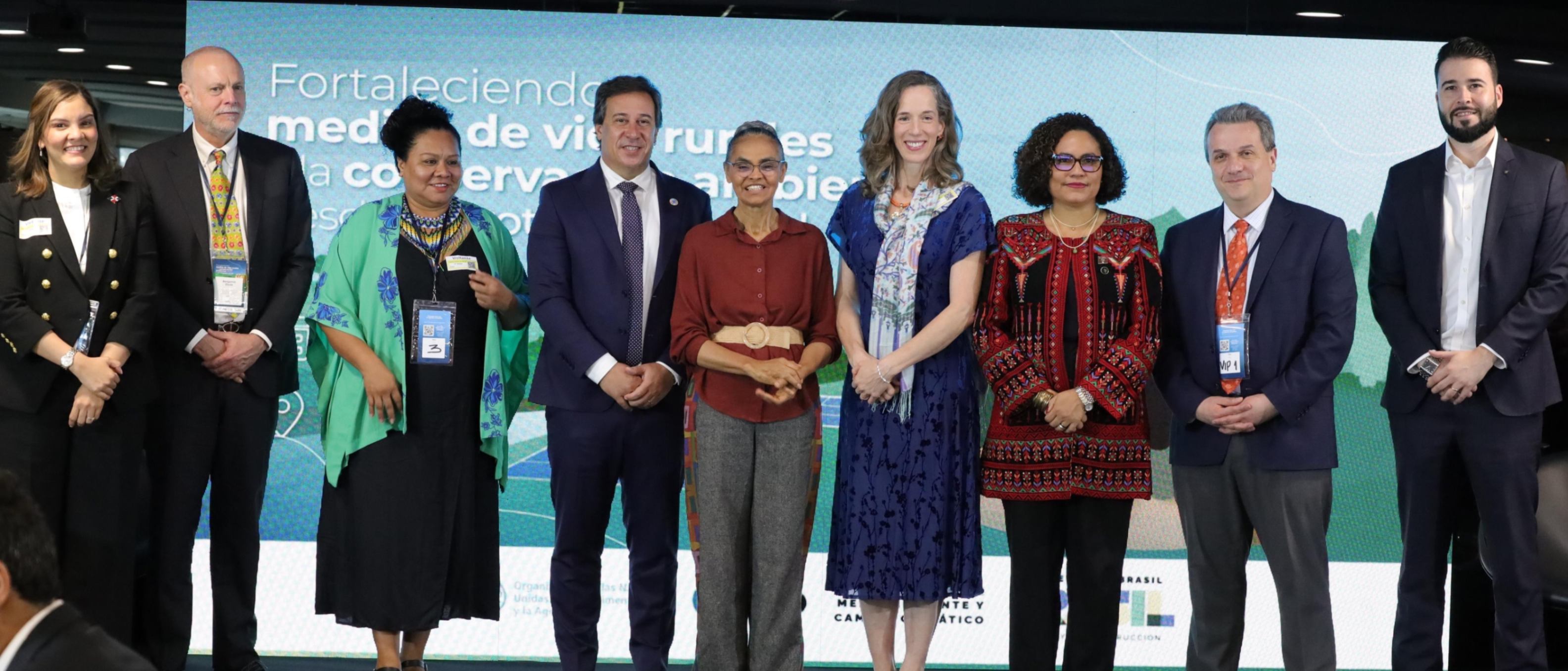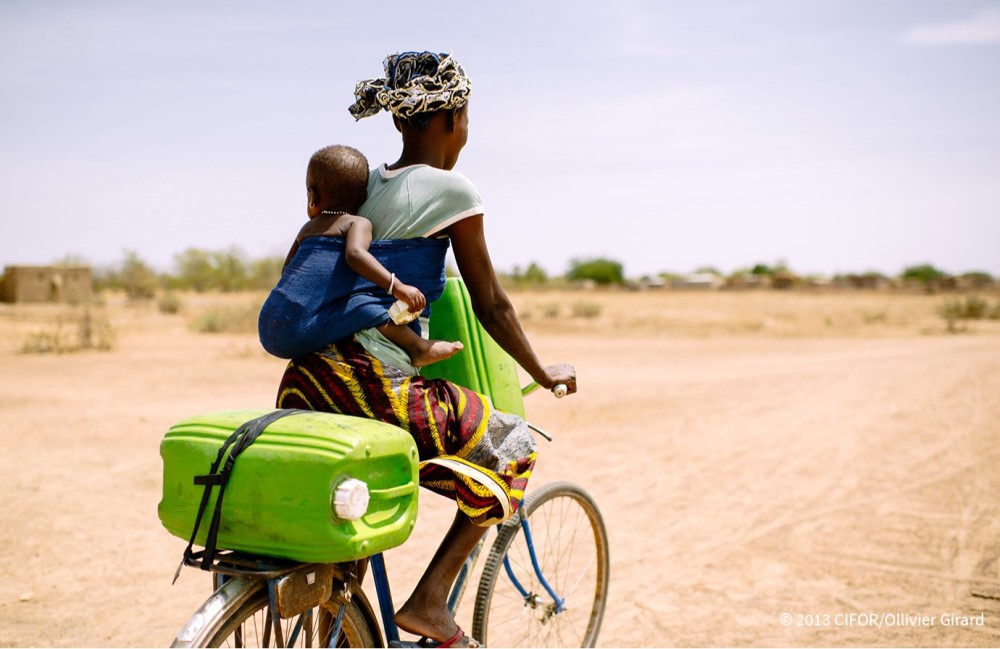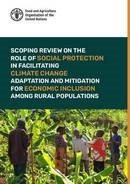FAO, the Inter-American Development Bank and Brazil´s Ministry of Environment and Climate Change advocate for greater use of social protection for inclusive climate action
The collaboration aims to inform the Global Alliance Against Hunger and Poverty and COP 30, promoting policies and financing that strengthen rural livelihoods, environmental conservation and inclusive climate action through social protection.

Marina Silva, Minister of Environment and Climate Change of Brazil, alongside other participants during the opening session of the high-level event on Strengthening Rural Livelihoods and Environmental Conservation through Social Protection.
Rome- Social protection policies and programmes have proven effective in contributing to both social and environmental goals, offering a pathway to climate action that meets the needs of vulnerable rural populations.
To advance this agenda, delegations from ministries of environment, climate-related and social development from nine countries in Latin America and the Caribbean, as well as experts from multilateral organizations, development banks, academia, and civil society, convened in Brasília (Brazil) on March 18 and 19 for an event organized by the Food and Agriculture Organization of the United Nations (FAO) and the Inter-American Development Bank (IDB), in collaboration with the Brazilian Ministry of Environment and Climate Change.
"We urgently need to transform unsustainable development models. This requires looking at the social side together with the environmental side, thinking about vulnerable communities,” said Marina Silva, Minister of Environment and Climate Change of Brazil, during the opening ceremony. “Environmental policies need to be cross-cutting to succeed,” she added.
“Social protection can play a role in resolving the tension between environmental protection and poverty reduction by protecting and promoting livelihoods,” explained Marco Knowles, FAO Social Protection Team Leader, during his intervention. "This integrated approach is central to FAO’s work in making climate action more inclusive."
Pablo Ibarrarán, Chief of the IDB's Social Protection and Labor Markets Division, underscored its importance in fostering resilience and supporting communities to adapt. "Social protection not only addresses immediate needs but also builds the capacities of the most vulnerable households for a more stable future," he said.
2304874c-0ca3-43d3-9339-4a190079dbe0.jpg?sfvrsn=d07d0107_1)
Addressing the financial shortfall
Experts called for climate and environmental financing to pay special attention to family farmers and Indigenous Peoples, who are essential to food security and environmental conservation.
Building on forthcoming FAO research, Matthew Walsham, FAO Social Protection and Climate specialist, noted that in a review of more than 500 projects across the portfolio of the United Nations Framework Convention on Climate Change (UNFCCC) climate funds, only 25 incorporated social protection for rural populations, primarily through the Green Climate Fund (GCF).
"There is a significant scope to do more and do it better," he said, highlighting opportunities to scale up investments in social protection systems, enhance cross collaboration between ministries of environment, agriculture and social development, and integrate social protection into national climate strategies.
Walsham also called for more attention to innovative financing mechanisms that could be used to invest in social protection, enhancing rural livelihoods while delivering climate and biodiversity outcomes. For example, by using carbon and biodiversity credits to support resilient livelihoods, or by incorporating social outcomes into debt-for-climate swaps, where a portion of a country’s debt is refinanced in exchange for commitments to protect and conserve the environment.
Harnessing growing global momentum
The opportunities, challenges, and lessons learnt during the event will guide the Global Alliance Against Hunger and Poverty, launched by the Brazilian G20 presidency in 2024. Central to the Alliance is its Policy Basket, a collection of evidence-based policy instruments and programmes that can be tailored to the specific national or regional needs. “Leveraging social protection systems to strengthen livelihoods while conserving ecosystems depends on a strong institutional coordination and multisectoral approach. The Global Alliance precisely aims at fostering this coherence between socio, economic and environmental sectors to meet the SDGs,” pointed out Gala Dahlet, FAO Social Protection Officer.
The insights will also inform preparations for the 2025 UN Climate Change Conference (COP30), which will be held in November in Belém, Brazil.
Models for learning worldwide
During the event, participants showcased experiences in designing and delivering cross-sectoral policies and programmes that combine poverty alleviation with environmental and climate objectives.
Brazil's Bolsa Verde Programme provides income and technical training in environmentally sustainable economic activities to rural populations living in conservation areas - many of whom are also beneficiaries of the Bolsa Familia social protection programme – in return for conserving the forest. Between 2011 and 2015, CO2 reductions from the programme were valued at USD 415 million -approximately four times its cost. The programme is led by the Ministry of Environment and Climate Change, in collaboration with the Ministries of Social Development and of Agrarian Development, among other actors.
The PROEZA project, implemented by the government of Paraguay with the support of FAO and financing from the GCF, promotes climate-resilient agricultural practices, native forest conservation and food security. It offers Tekoporã beneficiaries -the country’s main conditional cash transfer - an environmentally conditioned cash transfer for adopting sustainable agroforestry, along with training and resources to help implement these practices. It also facilitates the introduction of energy-efficient cooking stoves. Central to the project design is the incorporation of climate analytics to strengthen the effectiveness of its interventions in the context of increasing droughts and extreme climatic events.
5a8b8c9e-512d-4674-ada7-93c04b8c420f.jpg?sfvrsn=64ab0c8_1)
FAO´s commitment to inclusive climate action
The event in Brasília aligned with FAO´s broader vision to harness social protection to foster inclusive climate action for rural populations.
An increasing body of evidence underscores this transformative vision for enhancing the role of social protection in tackling climate challenges. A recent FAO study confirms that social protection facilitates economic inclusion for rural populations in the context of climate change, while future studies will focus on gender-responsive programming, scaling-up financing, and enhancing the inclusion of Indigenous Peoples and people with disabilities.
In collaboration with partners, FAO promotes a Better Environment, Better Production, Better Nutrition, and Better Life. By integrating social protection with other sectors, FAO supports countries in designing policies and programmes that secure the right to social protection for vulnerable rural populations and helps them to thrive amidst climate change.


